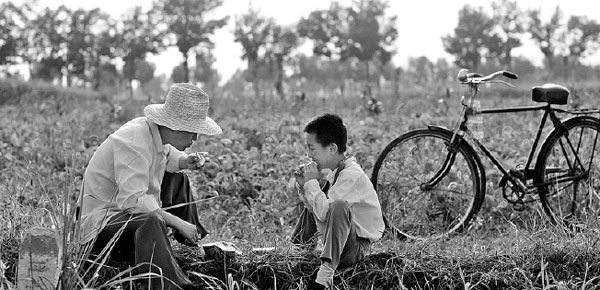Art-house film struggles to find screen space despite winning acclaim
By Xu Fan (China Daily) Updated: 2017-03-30 07:18In a small theater nestled in downtown Beijing, a stage play is performed. But this is no performance, but a press conference last week to promote a movie.
First-time director Zhang Dalei tells his actors to enact scenes from The Summer Is Gone, a nostalgic trip for Chinese in their 30s and 40s.
The film hit mainland cinemas on Friday.
The story, set in a northern town in 1994, unfolds in a sweltering summer. Told through the eyes of a 12-year-old boy, it relives an era which saw unprecedented change brought about by the privatization of State-owned companies.
|
The Summer Is Gone, a black-and-white film, relives an era which saw unprecedented change in a northern town in the 1990s. Photos Provided to China Daily |
"I was 12 years old in 1994. That year has lingered in my memory as a symbol of my teenage years. Everything changed after that," says the 35-year-old director.
Zhang, whose father was a film editor, had a movie-filled childhood in Hohhot, in the northern Inner Mongolia autonomous region.
Then, the latest movies - from hit comedies starring household star Chen Peisi to Harrison Ford's The Fugitive - were screened for free for the staff and their families at the local studio where his father worked.
The Fugitive, released in the mainland in 1994, is widely seen as the first import to enlighten the Chinese about Hollywood blockbusters.
But Zhang later focused on art-house masters, especially French director Francois Truffaut, known for The 400 Blows.
"My account name on Sina Weibo (the Chinese equivalent of Twitter) is Truffaut. I worshiped his productions during my years in Russia," he says.
"The 400 Blows opened a door to make me realize that a cinematic story could be told in that way: Narrate your own story," says Zhang.
The 400 Blows, which won Truffaut the best director award in Cannes in 1959, is a semi-biographical tale exploring the inner world of the 13-year-old protagonist.
Zhang, who at one point dreamed of being a rock musician, went to Russia with a drummer friend to seek a new life in 1999. But he soon realized that it was not a practical dream, and began to study directing at the St Petersburg State University of Film and Television.
For most movie critics, The Summer Is Gone is seen as being influenced by Taiwan director Hou Hsiao-hsien and Japanese filmmaker Yasujiro Otsu for its slow pace and true-to-life story.
But Zhang says: "For me, the movie is emotional and personal, interwoven with my experiences and nostalgia."
To make his point, Zhang says that just days after he chose a 1990s building as a film set, the construction was torn down.
Speaking about the demolition of old buildings, Zhang says he hopes he can preserve "something old" through his work.
Zhang's nostalgia also resonates with the Chinese-language art-house circle.
In November 2016, the indie movie was the biggest winner at the 53rd Golden Horse Film Festival in Taiwan, taking home the best picture and the best new performer awards.
But even after winning the awards, Zhang did not imagine that his directorial debut would be released for general viewing.
Typically, art-house movies struggle for screen space in China, as theaters are taken up by commercial productions, which are much safer commercial alternatives.
However, The Summer Is Gone has beaten the odds.
Since its release, nearly 110 cinemas have promised a prime-time screening every night for the black-and-white drama for at least two weeks.
The cinemas are members of the China Art-house Movie Screening Alliance, the country's first circuit specializing in the distribution of art-house titles, says Sun Xianghui, the head of China Film Archive, which launched the circuit.
Meanwhile, despite the film's success, Ya Ning, the president of the film's key producer iQiyi Motion Pictures, is concerned about how the movie will fare in comparison with Kong: Skull Island, which premiered the same day as The Summer Is Gone.
"The two have a huge gap when it comes to screenings. So, I am begging cinema managers to give the movie a bit more screen space. After all, a big screen is the best way to celebrate an award-winning movie," he says.
However, latest statistics show The Summer Is Gone has been squeezed to just 2 percent of all Chinese screens, while the monster-themed behemoth is dominating nearly 58 percent, according to the live tracker 58921.com.
xufan@chinadaily.com.cn
- 'Cooperation is complementary'
- Worldwide manhunt nets 50th fugitive
- China-Japan meet seeks cooperation
- Agency ensuring natural gas supply
- Global manhunt sees China catch its 50th fugitive
- Call for 'Red Boat Spirit' a noble goal, official says
- China 'open to world' of foreign talent
- Free trade studies agreed on as Li meets with Canadian PM Trudeau
- Emojis on austerity rules from top anti-graft authority go viral
- Xi: All aboard internet express












